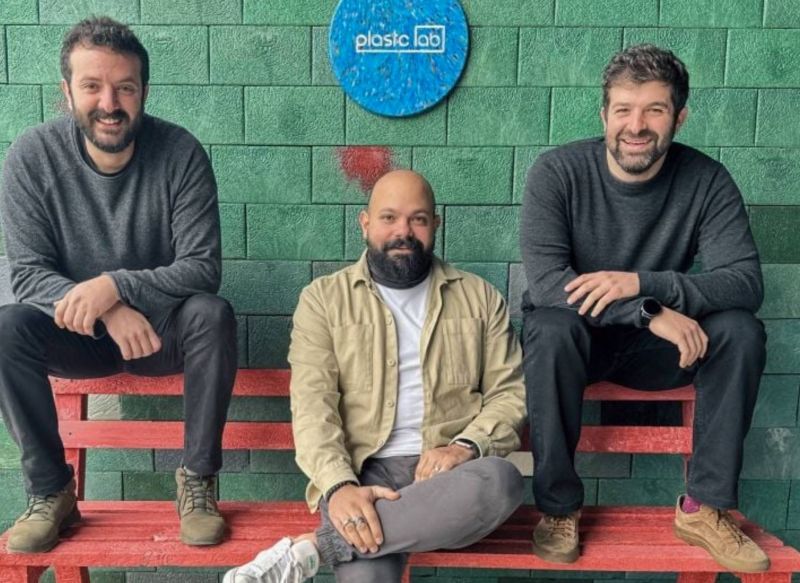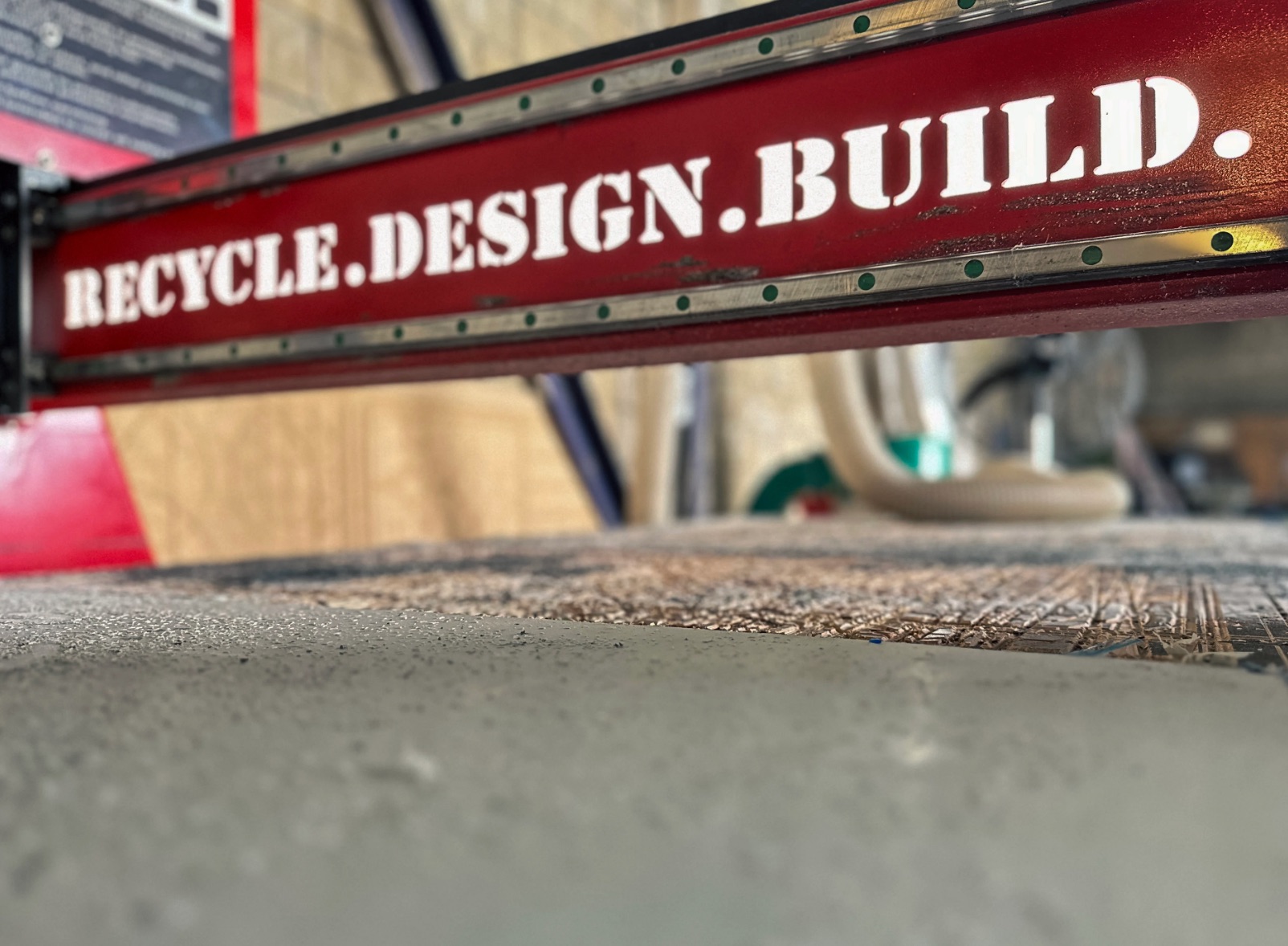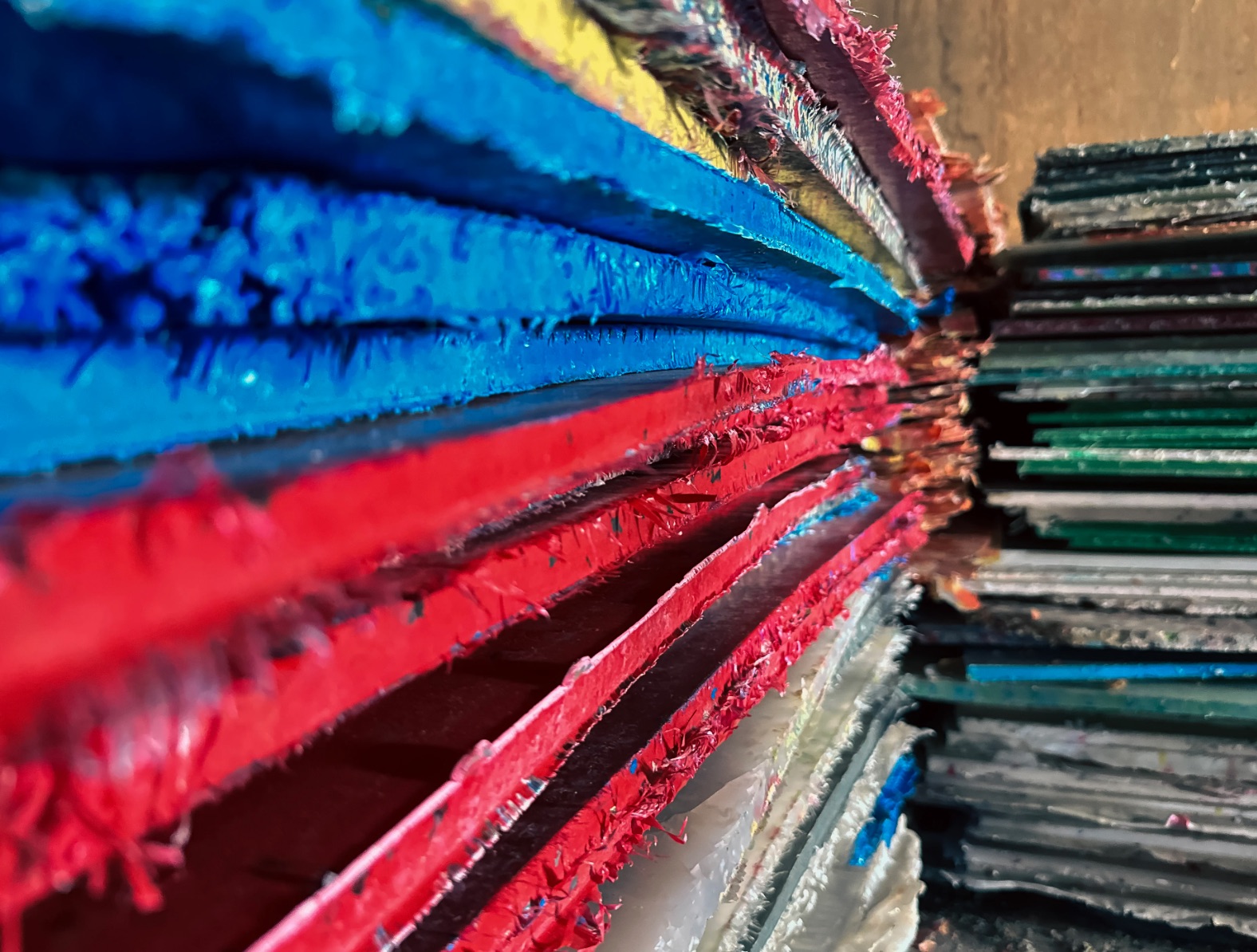
Rami Sbeih (L), Ralph Bourji (C) and Ralph Sbeih (R), the three co-founders of Plastc Lab, seated on a recycled plastic bench, in front of a wall made of recycled plastic bricks. (Credit: Fouad Gemayel/OLJ)
Plastc Lab is on a mission and has no intention of stopping anytime soon. The initiative aims to encourage recycling plastic while democratizing the use of this processed material. Lebanon currently reintegrates into the circular economy only a tiny quantity of the nearly 1,000 tons of plastic waste it produces every day, and Plastc wants to prove that social entrepreneurship and business can go hand in hand.
“The plastic we obtain is resistant to water and mold. It can be customized and is still recyclable. What’s more, its price is competitive with similar products made from different materials,” said Rami Sbeih, the company’s CEO and one of its three co-founders. Today, the company focuses on the production of tables, chairs and benches for indoor and outdoor use.
Despite all its advantages, the use of recycled plastic is still unpopular in the country and is “frowned upon by the public,” said Rami Sbeih. “It’s perceived as being cheap, smelly, not as good or not as beautiful as normal plastic.”
“But these are all misconceptions, and we want to use our products to help change this perception. Given the lack of recycling in Lebanon, we think there’s great potential there,” he continued.
The trio
Established in Halat in 2020 in a 1,500 m² facility, the company looks like an enormous research and development center, with a daily stream of tests and prototypes. The process began a year ago, when Rami Sbeih, a biochemist, started experimenting at home.
Inspired by plans shared on the preciousplastic.com platform, dedicated to plastic recycling, this nature enthusiast decided to build his own machines. He designed a plastic shredder and injector that he uses on plastic waste collected from his entourage.
This processed plastic is then stored, washed and recycled in a plot of land next to the family home in Wata al-Joz, Kesrouan.
Although Lebanon was hit by a multidimensional crisis at the end of 2019, Rami’s project was taking shape. Together with his brother Ralph, a civil engineer, they set about finding the means to move up a gear. They applied to programs designed to help entrepreneurs and managed to obtain the funding they needed to get their project on track. They got €30,000 from Makesense and $37,000 from Berytech in 2020 and took on board Ralph Bourji, a mechanical engineer and childhood friend. The trio then launched Plastc Lab.
The roles were divided as follows: Rami, CEO; his brother, head of strategy; and Ralph Bourji, operations manager. They went on to win one competition after the other, obtaining a total of nearly $250,000. They used this money mainly to build and acquire new machines. It also helped them experiment and vary their processes, and to explore different uses for their recycled plastic.
 The machine used by Plastc Lab to cut recycled plastic boards. (Credit: Fouad Gemayel/OLJ)
The machine used by Plastc Lab to cut recycled plastic boards. (Credit: Fouad Gemayel/OLJ)
“Since our launch, we’ve been more like a laboratory than a company that mass-produces and markets finished goods,” said Ralph Sbeih.
The team has had to adapt the machines and instruments. “Eighty percent of our machines are made in Lebanon,” said Ralph Bourji.
The right formulas
In addition to launching Plastc Lab, the entrepreneurs have had to learn more about the plastics they work with to find the right formulas to make the best possible products.
The raw material used by the company is made up mainly of two of the seven categories of plastic recognized in the large family of this material.
The first is known as HDPE (high-density polyethylene) and is generally used in the manufacturing of plastic bottle tops, detergent bottles and toys. The second, abbreviated PP (polypropylene), is generally used in the manufacture of medicine bottles, yogurt bottles and food cans.
To source its plastics, Plastc Lab works with several NGOs that take care of the collection and sorting.
“We have also tried to source plastics from the informal sector [people who collect plastics and other materials], but this experiment was not very successful, as several types of plastic were mixed together and then shredded,” said Ralph Sbeih.
Today, the group produces beams up to 2.5 meters long and one meter long, one meter wide and 0.4 to 5 centimeters thick plastic sheets. Plastc Lab then reworks these intermediate products to make tables, chairs, benches or bricks for walls building. The majority of their customers are currently local and international environmentally friendly organizations.
“For the time being, we mainly work on a business-to-business basis, for relatively large projects,” said Ralph Bourji.
2024, the year of transition
With a staff number rising from five in 2020 to ten in 2023, the company plans to take on two more employees this year, including a product designer.
“2024 will see the transition from an experimental laboratory to a company specializing in the design of products and outdoor furniture. We now want to focus on the design and production of products that succeed with a wider audience,” said the head of strategy.
 The recycled plastic plates are between 0.4 and 5 centimeters wide. (Credit: Fouad Gemayel/OLJ)
The recycled plastic plates are between 0.4 and 5 centimeters wide. (Credit: Fouad Gemayel/OLJ)
Since its launch in late 2020, Plastc Lab estimates that it has recycled 80 tons of plastic, including 30 tons in 2022 and 2023.
“That’s 80 lorries of plastic that hasn’t been dumped in landfills,” he said.
“This year, our objective is to recycle some 60 tons,” said Rami Sbeih, who added that he intends to continue developing the company’s partnerships, which include training courses and workshops for Lebanese schools and universities.
“2024 will also be the year in which we prepare to enter the Saudi market, with an opening set for 2025. It’s the biggest market in the region and the potential there is enormous. This is a major opportunity for us,” said the CEO.
The aim is to set up a factory there and organize conferences and training workshops.
This article was originally published in French in L'Orient-Le Jour. Translation by Joelle El Khoury.